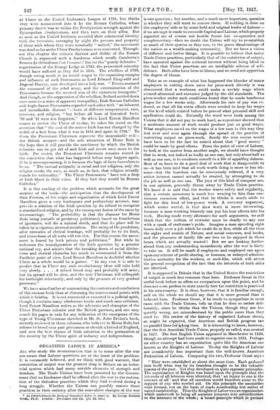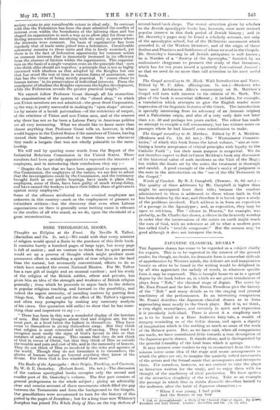ORGANIZED LABOUR IN AMERICA.*
ALL who study the reconstruction that is to come after the war are aware that :Labour questions are at the heart of tho problem. It is commonly believed, and we think with good warrant, that restriction of output was the greatest drag in Britain on an indite. trial system which had many notable .elements of strength and freedom. The Trado Unions have been promised by the Govern- ment that no hindrance shall be offered after the war to the restora- tion of the defensive practices which they had evolved during a long struggle. Whether the 'Unions can possibly restore those practices in their entirety after the convulsive changes of the war • An Inhndoetion to the Study of Organized Labor in Ansee;za. By George Gorham Groat, rb.B. Loz■dos; Wsemilan sod Co. 17s. 6d. aot.J is one question ; but another, and a much more important, question is ,whether they will want to restore them. If nothing is done on the employers'- side or by some-bold and original loader of .Labour-- if no attempt is made to reconcile Capital andLabour, whichproperly regarded are- of course not hostile forces but co-operative and complementary—then no doubt the Unions will try to reestablish as much of their system as they can, to the grave disadvantage of the nation as a wealth-making community. But we have a vision of different and bettor things. It is possible to believe that many Trade Union practices, particularly that of the restriction of output, have operated against the national interest without being blind to the fact that Union practices aro an intelligible scheme of self- defence. Both sides have been to blame, and we need not apportion the degree of blame.
Take as an example of what has happened the blunder of many employers in cutting down rates for piece-work directly it was discovered that a workman could make a weekly wage which scorned abnormal and excessive judged by the old standards. The piece-worker under such conditions found that-he made handsome wages for a few 'weeks only. Afterwards his rate of pay was re- duced, so that all his extra efforts were needed to keep his wages at the level which existed before he proved what personal skill and application could do. Naturally the word went forth among the Unions that it did not pay to work hard, as experience showed that a moderate amount of work would produce just as good wages. What employers saved on the wages of a few men in this way they lost over and over again through the spread of the practice of restricting output on piece-work. Surely the wise course would have been to let the fact be noised about that " good money " couldhe made by good efforts. From the point of view of Labour, to look at the matter from another angle, we should have thought that to work, not indeed as badly as ono can, but only about half as well as one can, is to condemn oneself to a life of appalling dulness. Most of us have to do a good deal of work that is disagreeable to us—it has been said that all work worth doing is more or less irk- some—but the boredom can be enormously relieved, if -a very active interest cannot actually be created, by attempting to do the job as well as one can. The joys of this-kind of conquest are. in .our opinion, generally thrust away by Trade Union practice. We know it is said that the worker wants safety and regularity, that a certain monotony is much loss wearing to him than con- tinuous conscious effort, and that he thinks -it worth while to fight for this kind of low-power work. A contrary argument, which scents unrest, is that slow worn is more interesting, because a man working leisurely can put his best efforts into his task. Having made every allowance for such arguments, we still think that tho todium of restraint must be deadly to any one with a spark of craftsman's pride. Imagine a man spending eight hours daily over a job which he could do in five, while all the time the sights and sounds of Nature, and social converse, and books, and the pleasures of family life aro. free 'to be enjoyed in those hours which are actually wastedl But we aro looking farther ahead than any understanding immediately after the war is likely to take us. It will be much if employers and employed can agree upon anyscheme of profit-sharing, or bonuses, or enlarged adminis- trative authority for the workers, or -such-like, which will attest the general recognition oUthe fact that the interests of both sides are identical.
It is supposed in Britain that in the United States the restriction of output is much less common than here. Professor Groat in the useful book before us offers no comparison upon this point, and he does not even profess to state exactly how far restriction is practised in his owncountry. It is clear, hoctoeer; that it is familiar enough, and on the whole we should say that it is more general than is believed here. Professor Groat, if he tends to Sympathize in most cases with the Trade Unions, tolls us that he does so rather deli- berately, since he thinks that the Unions, though they are fre- quently wrong, aro misunderstood -by the public more than they need leo. His review of the 'history of organized Labour shows, as might -be expected, that American and British progress ran on parallel lines for along time. It is interesting to know, however, that the first American Trade.Union, properly so called, was created in 1827. The first English Union appeared in Manchester in 1829, though an attempt had been made to organize one in 1824. Perhaps no other country has an organization quite-like the American one Imown as the Knights of Labour. To-day the Knights of Lebow are considerably less important than the woll-known American Fedoration of Labour. Comparing the, two, Professor Groat says " They were established at about the same time. Each gathered into itself what was by its founders thought to be the valuable lessons of the past. Yet they, developed on quite oppositeprinciplos. The organization of Knights was based upon the principle that the interests of all laborers were identical, that ' an injury to-one is the concern of all' and that all members would therefore.come -to the support of any who needed aid. On this principle the assemblies were formed, not on the basis of trade membership but rather of mixed membership. Thus the Knighis of Labor was an-organization which undertook to bring all separate interests into subordination -to the interests, of the whole; a broad principle which in present
society exists to any considerable extent in ideal only. In contrast with this the Federation has from the start admitted the conflict of interest even within the boundaries of the laboring class and has shaped its organization in such a way as to allow play for these con- flicting interests without interfering with the unity at points where the interests were common. Its basis of organization has been regularly that of trade units joined into a federation. Considerable autonomy remains to these units and this is freely exercised, yet there is in the fact of federation opportunity for common action on common interests that is immensely increased in its efficiency from the absence of friction within the organization. This organiza- tion on the basis of a single vocation rests on the principle that ` men who think alike should act together,' a principle that is not so highly tinctured with idealism as that adopted by the Knights but one that has stood the test of time in various forms of association, one that has the virtue of being sternly practical. It ` comes closer to human nature ' in its preservation of individual interests. From the standpoint of idealism the Knights represent the higher development, while the Federation reveals the greater practical insight."
We cannot follow Professor Groat through all his researches.
His examinations of the system of the " closed shop," to which non-Union members are not admitted—the great Steel Corporation, by the way, is pretty successful in making its "open shops" attract- ive by moans of a lavish paternalism—of the restriction of output, of the relations of Union and non-Union men, and of the reasons why there has not so far been a Labour Party in American politics are all very interesting. What we should like to know more than almost anything that Professor Groat tolls us, however, is what would happen in the United States if the members of Unions, having elected thoir loaders, proceeded to throw them over whenever they made a bargain that was not wholly palatable to the mem- bership.
We will end by quoting some words from the Report of the Industrial Relations Commission in the United States. Threo members had been specially appointed to represent the interests of employers, and in introducing their conclusions they say :- " Despite the fact that we have been appointed to represent, on this Commission, the employers of the nation, we are free to admit that the investigations made by the Commission, and the testimony brought forth at our public hearings, have made it plain that employers, some of them, have been guilty of much wrong-doing, and have caused the workers to have their fullest share of grievances against many employers."
Some of the offences attributed to the crooked employers are unknown in this country–rsuch as the employment of gunmen to intimidate strikers—but the discovery that oven when Labour organizations err there is generally some inciting cause is relevant to the studies of all who stand, as we do, upon the threshold of a great reconstruction.



























 Previous page
Previous page